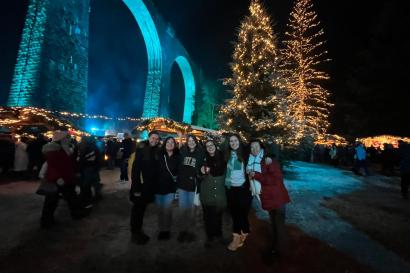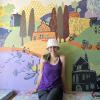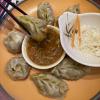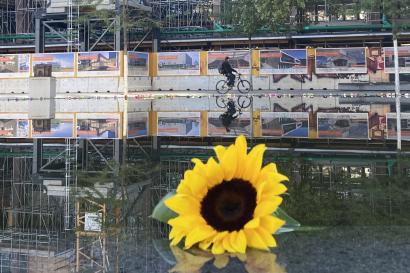
What did you do today? I get asked this a lot—by friends at dinner, by family over the phone late at night. I like this question because, unlike its cousin “How was your day,” “What did you do today?” is a question that really wants an answer. I know this because when I say “nothing” in return, people get upset. My friends are annoyed because they already spilled their story and now it’s my turn; my parents are disappointed because they miss me too much for “nothing” to be the answer they get. If you are reading this, then I’m betting the question “What did you do today?” is on your mind too, because you want to, plan to, or are about to go abroad and you want to know what it’s like and what to expect.
So here it is, a glimpse into my life. A warning: it’s pretty mundane, so mundane in fact that I forget I’m even here – wake up, go to school, eat, sleep, repeat. And then little moments snap me out of autopilot, like when I look up to see a Black Forest mountain peak hiding shyly behind a sinister wave of fog, and I remember: Wow, I’m really in Germany.
I get up at 8 a.m., or at least my alarm tells me to. Something you might find in foreign countries are metal blinds, the kind that require some muscle to roll up and come with a jarring metal on metal clank that is sure to grind your nerves. They are also supremely good at keeping sunlight out, which is why, half an hour past sunrise, my body still thinks it should be sleeping. I dress, pack my bag, and brush my teeth in our tiny 2-stall bathroom, which is layered with the progressive social opinions of semesters past. Stickers with messages like “space invaders against sexism” and pictures and phrases not suitable for kosher study abroad websites suit the image of edgy changemakers that I imagined German young adults to be. If this setting seems odd, it’s probably because American students are conditioned to the idea of moving into a blank slate and leaving it the same way at the end of the year. When I moved here, it was as if I were stepping into the history of other students' lives, students who chose yellow hallways and blue bathrooms, who like soccer and Into the Wild based on the cleats by the door and the movie poster on the wall.
I have three kind, considerate roommates: Lennard, Chris, and Sophia. I’ve never lived in a co-ed suite before and was surprised at how relaxed it is. Chance encounters in the kitchen lead to hours of discussion on world politics, the strengths and pitfalls of our respective educational systems (my roommates pay a little over 100 USD per semester?!), the confusing geography of the U.S., and the nuances of daily life.
And then there’s the distance—1.5 miles to be exact—between here and class. It’s common for student housing to exist separately from the urban campus, an inconvenience that is quickly solved by innumerable miles of bike lanes and a clean, inexpensive, and punctual tram system. This is how I get to school every morning. I grab an apple for breakfast, local to the region and usually bought at the farmers market, and then ride for 15 minutes. If I’m still hungry I get a pastry from any of the fantastic bakeries that dot the cityscape. From there I walk over cobblestones, past balconies and multiple century-old fountains to the IES Abroad Center for class.
Half the time, we don’t even stick around; the Center acts as a jumping off point for excursions to city neighborhoods and local businesses, organic farms and castle ruins. I’m constantly engaged with this amazing place and it’s the most fun I’ve had at school in a long time.
When class ends, I grab lunch with the close friends I’ve made since I arrived here in Germany. Mensa, the cafeteria, has local, diet friendly, and tasty food (yes, cafeteria food can actually be good!) for insanely low student prices. Instead of the buffet style I’m used to, we select from a series of pre-planned meals such as spaghetti soy bolognese and pumpkin curry with naan. Sometimes I go to Veggie Liebe for a falafel burger, where Stephan the owner knows my name and favorite orders by heart. Last time I ate there, he could tell I was having a down day and personally presented me with a plate of food art—peppers and mushrooms shaped into a goofy smiley face like the ones parents make with blueberries on their kids’ pancakes.
My favorite thing to do at the end of the day is to go on a hike. Urban sprawl is uncommon in this region of Germany, so a couple minutes from my dorm room are country fields. I walk through vineyards, past goats and sheep, through forest trails until I’m high enough on a surrounding mountain to see the entire city skyline before me. If I stay close to home, I’ll walk along the river and stop to admire the ponies or the spacey geodome in the community garden. I bring along a book and read at my favorite spot – a fallen log in a clearing by the creek. It’s picturesque; wispy fall leaves blanket the ground and shafts of sunlight pierce the canopy. If I close my eyes all I hear are the bubbling stream of water and the occasional laughs of kids playing outside.
There you have it, an average day of studying in Germany. Even if Freiburg isn’t your chosen destination, I hope that this post has given you some insight into what your life might look like in another country. Wake up, go to school, eat, sleep, repeat. Is it boring? Yes. Is it new and exciting? Also yes. When it’s both, getting lost in the routine can be the best part of studying abroad.
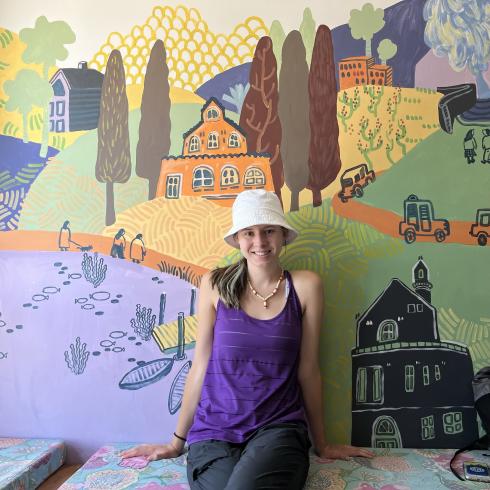
Isabel Pineo
Hi there! My name is Isabel Pineo and I am coming to you this semester from Freiburg im Breisgau, a charming city in the Black Forest of sunny southern Germany. The official reason I’m here: to learn about environmental studies in a culture and urban setting known for its emphasis on sustainability. Unofficial reason: to eat amazing food, go on lots of hikes, meet fascinating people both local and foreign, and to focus on putting my physical and mental health first. I guess you could say that I’m searching for answers to the question of what it means to live rightly in the world, for the Earth and for ourselves. Since most of us have been asking that question for a very long time, I’ll be sure to update you on all the answers I find as the semester progresses!
